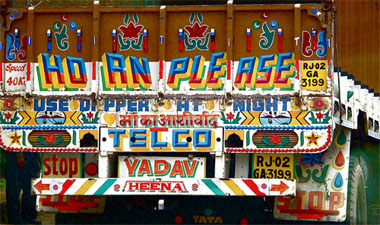
A Stay in India (6): The Humor of It All
- Subhash Chaudhri, our driver for two weeks in the Himalayas
My after-midnight taxi driver from the airport into Delhi knows just enough English to make his insistent attempts at conversation excruciating. Half drowned in the noise of his old Ambassador and the din of the truck traffic (a flood of lorries is held back from Delhi during the day, and released at night) he makes a series of disjointed inquiries, and is wholly unable to understand my responses. Fond of the 'back ways', he winds through deserted streets, over speed bumps and around barricades, past shanties and grimy shops until we finally reach the highway. Here we meet the stream of trucks, every one of which has three pieces of advice painted boldly on its back:
- Horn Please (which means, "if you want to pass me, lay on your horn all the way around so that at least I know you are coming")
- Use Dipper At Night (I never got clear about this, but I believe it is a request to flick your high beams. A misspelling we saw on one truck sounded like an appeal to the incontinent: "Use Diper At Night"
- Stop (painted always at the lower left — for what reason I never got a satisfactory answer).
All heavy Tata trucks sport a garish painted head of Kali or a mustachioed male deity in front, always with a full red tongue sticking out — in defiance, it seems, of the oncoming traffic. With so many fervent requests for Horn, plenty of horn is produced by every vehicle on the road. Often a defensive measure, sometimes even a lifesaver, the horn is most often like a nervous tick, fired every few seconds for no apparent reason.
Do we understand each other?"Waiter, what brand of mineral water do you serve?" We are used, by now, to people nodding their heads or saying "Yes" in a definitive tone, when the question is in fact not understood at all. So there is little surprise that in response to this question the waiter says simply "Yes!" My well-mannered friend Jonathan repeats the question, more slowly this time, "No, what brand of mineral water do you have?" Again the answer, "Yes," comes immediately. Jonathan’s bemused frustration is rising now, as he searches for a way to make himself clear. But the waiter feels his pain, and says in perfectly good English, "Sir, the brand of the mineral water is 'Yes'."
We do our best to arrange in advance the price we will pay for any special service — a boat ride, an extended taxi hire, a cycle rickshaw. But it all ends, almost always, in disagreeable haggling and indignation, as extenuations inevitably occur that raise the final price. I realize that this may be some kind of inter-cultural game, but it is draining, and especially obnoxious at sacred sites. It occurs to me that one would be well served to have cards printed up in advance that say, in English and Hindi, "I will pay you a total of ____ rupees in the end for your services — nothing more, no matter what. Do we have a deal?" Fill in the amount and hand it to your man before you start. It’s seems like a good idea, but I have no expectation of anything this rational actually working in the other-world that is India.
At Pandukeshwar, a checkpoint on the high road to the mountains, where the Pandavas did penance for the sins of the great war of the Mahabharata, all vehicles must stop, and cars and buses are assailed by shawl merchants who walk among the captive prospects with great armloads of merchandise. They knock on the windshields, reach in through open windows, and are unable to understand the word "No." We try to learn the Hindi for the full litany of refusal: "Not today. Not tomorrow. Not the day after tomorrow. Not forever." But the shawl-mongers just laugh, either at our pronunciation or our foolish idea that we could put them off so easily. Finally seeing what needs to be done, I get an irresistible urge to scramble on top of our car and shout, "Shawls! Shawls! I must have shawls!"
